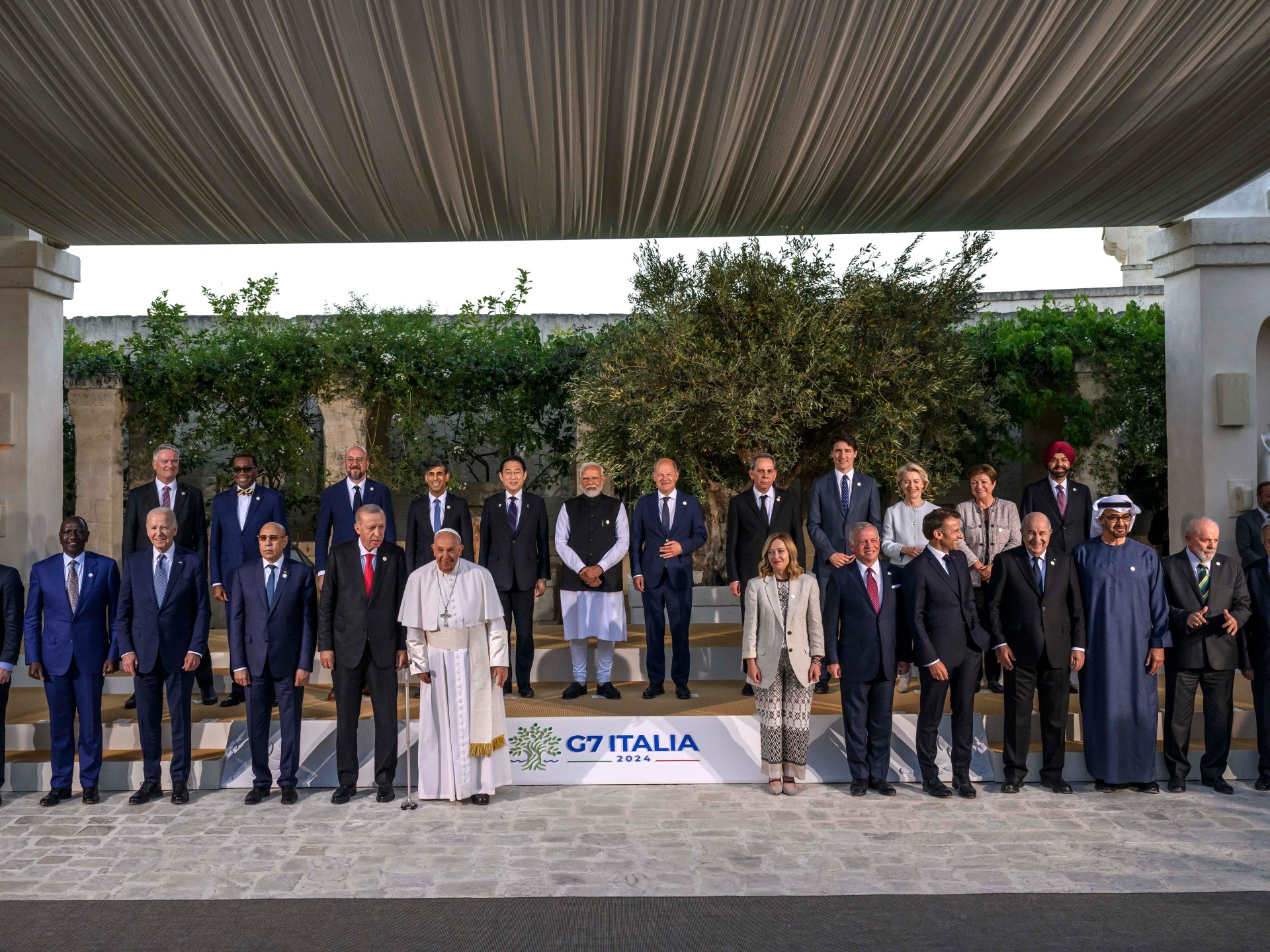
G7 leaders put on good show of unity, but look fragile at home | Gaza News
- Politics
- June 15, 2024
- No Comment
- 149
Fasano, Italy – This year’s G7 summit bore the hallmarks of a fragile club, yet one that still manages to put up a good fight when it comes to shielding Western interests.
On Saturday, the leaders of what were once the wealthiest countries in the world concluded the three-day G7 summit in Borgo Egnazia, a luxury resort nestled in the hills of Italy’s southern region of Puglia. But the group’s authority in global politics was overshadowed by trouble back home for most of its members.
French President Emmanuel Macron’s party took such a pounding at the European Union parliament elections last week that he called snap elections. In Germany, Chancellor Olaf Scholtz’s Social Democratic Party also suffered in the EU elections to the point that critics have called on him to follow Macron’s example. United Kingdom Prime Minister Rishi Sunak is already heading to the polls in early July for an election that most predict will see the end of his government, in a landslide victory for opposition party Labour, while the approval rating of Canada’s Prime Minister Justine Trudeau has plunged to a dismal 38 percent. And in Japan, Prime Minister Fumio Kishida‘s party has been mired in the throes of a political crisis since last year with some labelling the leader as Japan’s most unpopular premier since 1947.
Above all, the spectre of November’s United States presidential election has loomed large over this G7 summit, with the prospect of a comeback for Donald Trump, a former president who is openly sceptical of Washington’s multilateral agreements.

Despite the domestic challenges faced by G7 leaders, however, the group still managed to pull together a strong message of unity when it came to addressing the threats they see as undermining Western stability. Most significant was the announcement on Thursday that it will draw on frozen Russian assets to make a $50bn loan to Ukraine to support its efforts in the continuing war with Russia.
“The G7 projected an image of weakness and of failing political authority,” said Ettore Greco, vice director of Instituto Affari Internazionali. “But they performed very well on important dossiers such as Ukraine, Gaza and China, something that signals a clear convergence among them and sends a message of unity.”
Target number one was Russia’s President Vladimir Putin. As well as the $50bn loan to Ukraine, one day before the G7 summit began, the US announced a robust new round of sanctions against Russian entities and individuals. On the sidelines of the event, US President Joe Biden and Ukrainian President Volodymyr Zelenskyy signed an historic 10-year security pact, while a similar deal was signed between Ukraine and Japan.
The thorny issue of how to tackle growing global economic competition from China has also seen European allies moving closer to the US, which has traditionally taken a more confrontational line towards Beijing than they have. In an unprecedented move this week, the European Union hit China with tariffs up to almost 50 percent on Chinese electric vehicles, marking a big change in its trade policy. The US did the same in May.
Demonstrating their unity on this subject, the G7 leaders expressed their concerns about “China’s persistent industrial targeting and comprehensive non-market policies and practices that are leading to global spillovers, market distortions and harmful overcapacity in a growing range of sectors, undermining our workers, industries, and economic resilience and security” in a final statement issued by all G7 governments at the end of the summit.
One issue on which the G7 seems less united is that of abortion. Absent from this year’s final communique is the word “abortion” – a likely win for Meloni’s far-right party which opposes it. By contrast, the final statement of last year’s summit in Japan specifically called for “access to safe and legal abortion”. This year, the concluding statement mentions only “comprehensive sexual and reproductive health and rights for all”.

Shedding the ‘elitist’ veneer
And, while the club did manage to pull together over shared concerns, it was less obvious if it has succeeded in shedding its elitist image and becoming more inclusive of other countries – particularly those in the Global South – one of the key stated goals of this year’s summit.
Hosting the summit, Italian Prime Minister Giorgia Meloni invited a large number of guests including heads of state of India, Turkey, Brazil and the United Arab Emirates. Even Pope Francis made an appearance – a first for a pontiff. In part, these invitations reflect Meloni’s political ambitions in Africa and the Mediterranean, but were also designed to broaden the outreach of the club, often accused of being too Western and exclusive.
On Meloni’s mind, as well as those of the other G7 members, is the knowledge that the group cannot address world problems or confront threats from China and Russia by just talking to each other.
The question remains, however; just how attractive is the G7 these days to outsiders? Questions about the group’s legitimacy are not new. The G7 used to account for 70 percent of global gross domestic product (GDP) – a figure that has shrunk to just 40 today – while representing one-tenth of the global population. In a sign that global power dynamics are shifting dramatically, other global groups are growing. The BRICS countries – which include India, Russia and China – have doubled in number of members from five to 10 as of January this year.
Furthermore, protectionist policies and sanctions – two key elements which signified unity between G7 members this summit – are a primary source of pain for others.
“One of the reasons why many countries are watching rather than acting is because a lot of these Western nations are taking action that hurt their economies,” said Fredrik Erixon, an economist and director of the European Centre for International Political Economy. “None of these Western leaders have the capacity to say ‘We want to open up our economy with them’ and that makes it difficult for other countries to support Western geopolitical goals.”
The war in Gaza has deepened the divide. Western nations have been accused of double standards in their unwavering support for Ukraine, compared with their much softer stance on Israel’s conduct in the besieged strip where more than 37,000 Palestinians have been killed in eight months.
In its final statement, the G7 rallied behind a ceasefire plan outlined by Biden, stressing once again the group’s support for a two-state solution, including the recognition of a Palestinian state “at the appropriate time”.
The statement said that Israel “must comply with its obligation under international law” and “refrain from” launching an offensive in Gaza’s southern city of Rafah. Yet, it stopped short of condemning Israel for its conduct during this war, which is currently being investigated by the International Court of Justice – the world’s highest court – in a genocide case being brought by South Africa against Israel. There have been reports that Canada and France pushed for stronger language about Israel’s actions in Gaza, but the US and Germany opposed it.
“For many countries around the world, the G7’s failure to adopt a stronger stance on the war in Gaza represents the starkest example of the West’s duplicity,” said Rafael Loss, EU security expert at the European Council on Foreign Relations.
#leaders #put #good #show #unity #fragile #home #Gaza #News








